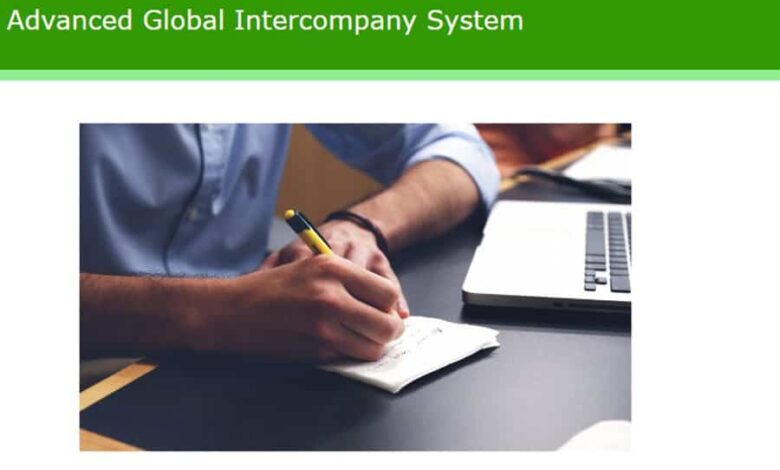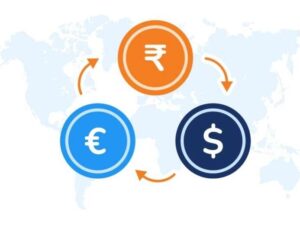What is Advanced Global Intercompany System and it’s types?

Introduction
Advanced global intercompany system and it’s types are very important to understand. AGIS is a comprehensive information technology system designed to enable and support a company’s international operations across different time zones, languages and cultures.
Further, these systems are essential because they can be used for the management of internal activities, external relationships, and internal business processes. Such systems help companies to reduce costs and increase efficiency.
Moreover, these systems include advanced supply chain systems, asset optimization systems, enterprise resource planning (ERP) systems, customer relationship management (CRM) systems, and finance and accounting systems.
In addition, The development of such systems has been made possible because of recent advances in the IT industry. The advancement of IT has led to the rise of new technologies, which are being widely used in the field of advanced global intercompany systems.

Overview of advanced global intercompany systems
It is very important to have advanced global intercompany system. Intercompany transactions between different countries require a lot of information to be exchanged, and this information is stored in databases.
Additionally, An intercompany system will help you to store the information in a computerized format. This will make it much easier for you to find what you are looking for. The information stored in an intercompany system will help you to carry out your business activities with ease.
Importantly, An intercompany system will help you to eliminate duplicate data entry and data processing errors. When you work in a small company, you will probably have to deal with a lot of paperwork.
Further, It can be a lot of work to record and update data about your clients, suppliers and customers. Using a global intercompany system will make your work easier because it will automate the process.
Moreover, Using an advance global intercompany system will also save you money. This is because the global intercompany system will save you the cost of labor and other resources needed to manually input data into your database.
There are various types of advanced global intercompany systems. The different types of advanced global intercompany systems include:
Electronic global intercompany data exchange (EGIDE)
The electronic global intercompany data exchange (EGIDE) technology enables companies to exchange data via the Internet. The information exchanged can be both financial and non-financial in nature.
Moreover, This technology offers benefits to businesses. It enables businesses to reduce operational costs and it improves performance. The exchange of data across borders is also supported. The system also provides real time access to data. It also provides the ability to share data. The data is kept secure.

International trade management system (ITMS)
The international trade management system (ITMS) provides companies with a solution that enables them to manage trade. It can be used to collect, analyze, evaluate and manage trade. The ITMS uses a web interface for the exchange of trade data.

Advanced features of Advanced global intercompany systems
Advanced Global Intercompany Systems provide a secure platform for efficient collaboration across multiple organizations. They enable companies to manage complex supply chains, automate intercompany processes, and provide real-time data and analytics that help improve operational efficiency.
Moreover, With advancements in technology, these systems have become more sophisticated and offer advanced features that can help companies streamline their operations even further. In this article, we will discuss some of the advanced features of advanced global intercompany systems.

Real-time Data Visibility
One of the key features of advanced global intercompany systems is real-time data visibility. Intercompany data is very important to all businesses. It’s a crucial part of managing business information. You will find that this type of data is usually stored in a spreadsheet format.
In addition, There is a database that contains all the intercompany transactions that have taken place over a certain period of time. This is where the intercompany data is stored. It is possible to access the intercompany data using a number of software packages.
Moreover, This type of data is usually called “real-time” because it is available in real-time. If you want to get the best out of intercompany data, you should use a package that supports real-time data.
Importantly, With this type of package, you will be able to access real-time intercompany data and you will also be able to make adjustments in real-time as well.

Automated Intercompany Reconciliation
Intercompany reconciliation is a time-consuming process that requires a lot of manual effort. Advanced global intercompany systems offer automated intercompany reconciliation, which can help companies save time and reduce errors.
In addition, Intercompany reconciliation refers to the process of matching intercompany transactions. This process includes matching invoices and receipts.
For example, if Company A sends an invoice to Company B and Company B receives it, the companies should match the invoice and the corresponding receipt so that no money gets lost. Intercompany reconciliation is an important process that can save a company a lot of time.
Moreover, This is because it can save time when there are a lot of invoices and receipts. This process should be done manually by a bookkeeper or someone else with experience. It involves comparing the information in the two files to make sure that everything is correct.
Importantly, The process should include checking the company’s address, name, and phone number. It should also be checked whether the numbers match up and whether the names and addresses of the companies are the same.

Automated Intercompany Billing
Another advanced feature of global intercompany systems is automated intercompany billing. One of the main benefits of using automated intercompany billing is that it saves time. The more time you spend on an intercompany billing project, the less time you have to spend on other tasks.
In addition, You can avoid spending extra time on manually entering intercompany transactions. Using this technology can also allow you to make sure that you are properly recording intercompany transactions. If you don’t use this technology, you may not be able to record these transactions accurately.
Moreover, It is possible to make mistakes when you enter intercompany transactions manually. For example, you may forget to account for something or to charge the right amount. It can also be challenging to do this manually because you may have to search for the right document.
![]()
Multi-Currency Support
Companies that operate in multiple countries and regions often have to deal with different currencies. Advanced global intercompany systems offer multi-currency support, which allows companies to transact in different currencies and automatically convert them to the company’s base currency.
In addition, Multi-currency systems can make life easier for companies that operate in multiple countries and regions. The process of converting transactions between different currencies is automated.
Moreover, Companies that operate in different countries don’t have to worry about currency conversion because these systems convert different currencies to the base currency.
Importantly, The conversion process can be done automatically, so it is not necessary to deal with currency conversion manually. This can help companies reduce currency exchange risks and simplify their accounting processes.

Advanced Security and Compliance
Advanced security and compliance systems are used by organizations that want to protect their financial data. There are many reasons why these systems are used.
In addition, One of the most important reasons is to protect financial data. Advanced security and compliance systems can help you comply with various regulatory requirements. They can help you protect your financial data.
For example, some countries require companies to maintain strict controls over sensitive information. A compliance system can provide you with access control, audit trails, and encryption.
Moreover, Advanced systems can help you comply with the requirements set by various governments. If you want to protect your company’s financial data, you should consider investing in an advanced security and compliance system.

Case study of Advanced global intercompany systems in action
A multinational corporation using an advanced global intercompany system to streamline intercompany transactions and improve financial reporting
Further, The company has implemented a system that uses information technology to integrate the various types of transactions and exchanges with companies throughout the world. For example, if a company needs to sell goods to another company, the customer pays a deposit.
Moreover, the bank issues an invoice to the supplier based on the value of the transaction. At the same time, the supplier gets credit from the bank for the amount due. In the future, instead of sending a separate invoice and getting a separate credit from the bank, the bank automatically credits the supplier’s account once the customer’s bank settles the invoice.
Importantly, When a supplier’s account is debited, the supplier automatically receives the deposit. The supplier receives the cash, and the customer can deduct the deposit from its taxes.

Challenges and considerations when implementing Advanced global intercompany systems
If you’re considering adopting an advanced global intercompany systems (AGIS), you may ask yourself what challenges you will encounter when implementing the system. There are challenges that are similar to implementing any type of software.
Further, The main challenge with AGIS is that you have to coordinate between different companies and they may have different IT infrastructures and data security policies. It may take a while to identify the challenges and the best way to implement the system.
Moreover, You may want to consider all the aspects of the project before you launch it. First, you’ll need to figure out which technology to use. It’s a good idea to make sure you can get all the support that you will need.
In addition, You should check whether there are any compatibility issues. Also, you’ll have to decide how the information will be stored. Will you use the cloud? If so, what kind of security is required? The next step is to make sure that all the business processes are up to date.

Conclusion
Advanced global intercompany systems can help a company to save money and time, which can be used for other productive activities. These systems are also beneficial to companies that want to be more competitive in the global market.
Further, these systems are helpful in the areas of information sharing, reducing human error, improving business management, and increasing the level of communication. Companies that use advanced global intercompany systems will have better and faster decision making.
Moreover, They will also have a better understanding of the operations of their competitors. Companies that use advanced global intercompany systems will be able to identify new business opportunities, reduce unnecessary expenses, and increase the effectiveness of their marketing campaigns.



